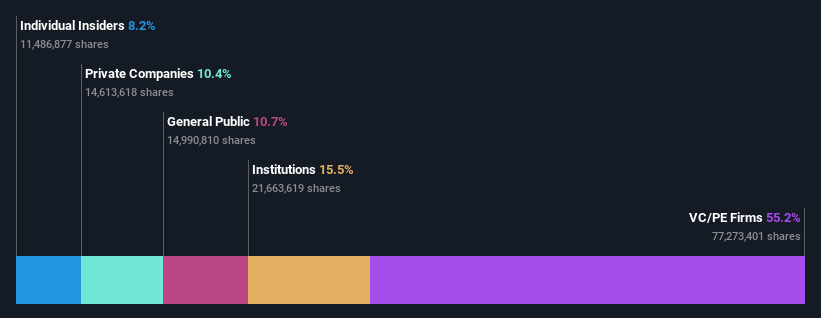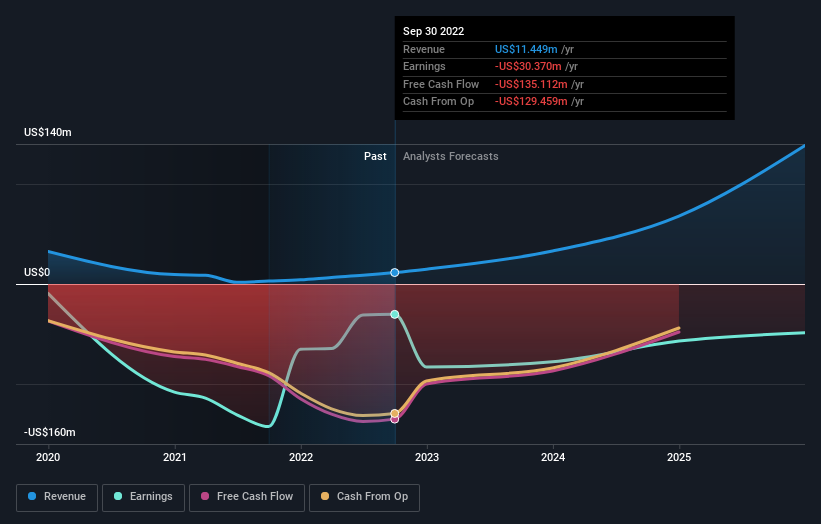- United States
- /
- Healthtech
- /
- OTCPK:PEAR.Q
Painful week for private equity firms invested in Pear Therapeutics, Inc. (NASDAQ:PEAR) after 17% drop, institutions also suffered losses

Key Insights
- Significant control over Pear Therapeutics by private equity firms implies that the general public has more power to influence management and governance-related decisions
- A total of 5 investors have a majority stake in the company with 55% ownership
- Insiders have sold recently
If you want to know who really controls Pear Therapeutics, Inc. (NASDAQ:PEAR), then you'll have to look at the makeup of its share registry. With 55% stake, private equity firms possess the maximum shares in the company. That is, the group stands to benefit the most if the stock rises (or lose the most if there is a downturn).
Following a 17% decrease in the stock price last week, private equity firms suffered the most losses, but institutions who own 15% stock also took a hit.
Let's delve deeper into each type of owner of Pear Therapeutics, beginning with the chart below.
See our latest analysis for Pear Therapeutics

What Does The Institutional Ownership Tell Us About Pear Therapeutics?
Many institutions measure their performance against an index that approximates the local market. So they usually pay more attention to companies that are included in major indices.
Pear Therapeutics already has institutions on the share registry. Indeed, they own a respectable stake in the company. This can indicate that the company has a certain degree of credibility in the investment community. However, it is best to be wary of relying on the supposed validation that comes with institutional investors. They too, get it wrong sometimes. If multiple institutions change their view on a stock at the same time, you could see the share price drop fast. It's therefore worth looking at Pear Therapeutics' earnings history below. Of course, the future is what really matters.

Pear Therapeutics is not owned by hedge funds. Looking at our data, we can see that the largest shareholder is Temasek Holdings (Private) Limited with 19% of shares outstanding. In comparison, the second and third largest shareholders hold about 12% and 8.6% of the stock. In addition, we found that Corey McCann, the CEO has 7.8% of the shares allocated to their name.
To make our study more interesting, we found that the top 5 shareholders control more than half of the company which implies that this group has considerable sway over the company's decision-making.
While it makes sense to study institutional ownership data for a company, it also makes sense to study analyst sentiments to know which way the wind is blowing. There are plenty of analysts covering the stock, so it might be worth seeing what they are forecasting, too.
Insider Ownership Of Pear Therapeutics
The definition of an insider can differ slightly between different countries, but members of the board of directors always count. The company management answer to the board and the latter should represent the interests of shareholders. Notably, sometimes top-level managers are on the board themselves.
Insider ownership is positive when it signals leadership are thinking like the true owners of the company. However, high insider ownership can also give immense power to a small group within the company. This can be negative in some circumstances.
Shareholders would probably be interested to learn that insiders own shares in Pear Therapeutics, Inc.. It has a market capitalization of just US$115m, and insiders have US$9.5m worth of shares, in their own names. Some would say this shows alignment of interests between shareholders and the board, though we generally prefer to see bigger insider holdings. But it might be worth checking if those insiders have been selling.
General Public Ownership
The general public-- including retail investors -- own 11% stake in the company, and hence can't easily be ignored. While this size of ownership may not be enough to sway a policy decision in their favour, they can still make a collective impact on company policies.
Private Equity Ownership
With a stake of 55%, private equity firms could influence the Pear Therapeutics board. Sometimes we see private equity stick around for the long term, but generally speaking they have a shorter investment horizon and -- as the name suggests -- don't invest in public companies much. After some time they may look to sell and redeploy capital elsewhere.
Private Company Ownership
It seems that Private Companies own 10%, of the Pear Therapeutics stock. It might be worth looking deeper into this. If related parties, such as insiders, have an interest in one of these private companies, that should be disclosed in the annual report. Private companies may also have a strategic interest in the company.
Next Steps:
It's always worth thinking about the different groups who own shares in a company. But to understand Pear Therapeutics better, we need to consider many other factors. For instance, we've identified 4 warning signs for Pear Therapeutics (1 is significant) that you should be aware of.
If you would prefer discover what analysts are predicting in terms of future growth, do not miss this free report on analyst forecasts.
NB: Figures in this article are calculated using data from the last twelve months, which refer to the 12-month period ending on the last date of the month the financial statement is dated. This may not be consistent with full year annual report figures.
New: Manage All Your Stock Portfolios in One Place
We've created the ultimate portfolio companion for stock investors, and it's free.
• Connect an unlimited number of Portfolios and see your total in one currency
• Be alerted to new Warning Signs or Risks via email or mobile
• Track the Fair Value of your stocks
Have feedback on this article? Concerned about the content? Get in touch with us directly. Alternatively, email editorial-team (at) simplywallst.com.
This article by Simply Wall St is general in nature. We provide commentary based on historical data and analyst forecasts only using an unbiased methodology and our articles are not intended to be financial advice. It does not constitute a recommendation to buy or sell any stock, and does not take account of your objectives, or your financial situation. We aim to bring you long-term focused analysis driven by fundamental data. Note that our analysis may not factor in the latest price-sensitive company announcements or qualitative material. Simply Wall St has no position in any stocks mentioned.
About OTCPK:PEAR.Q
Pear Therapeutics
A commercial-stage healthcare company, develops and sells software-based medicines in the United States.
Mediocre balance sheet and slightly overvalued.
Similar Companies
Market Insights
Community Narratives




